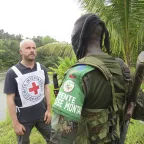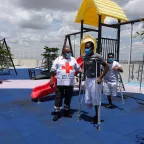Dialogue with weapon bearers
It is those who carry weapons who can kill – and be killed. It is also they who can facilitate or hinder humanitarian action. The ICRC therefore maintains a dialogue with all weapon bearers, State …
It is those who carry weapons who can kill – and be killed. It is also they who can facilitate or hinder humanitarian action. The ICRC therefore maintains a dialogue with all weapon bearers, State …

After a life-changing injury, physical rehabilitation is the key to a full and independent life. Helping those wounded in armed conflict to recover functioning and live a full life. Bringing …

The ICRC is funded by voluntary contributions from the states party to the Geneva Conventions (governments); National Red Cross and Red Crescent Societies; supranational organizations (such as the …

Try one of the following resources:
Created in 1863, the ICRC library, alongside the ICRC archives, provides an indispensable documentary reference on the organization itself and international humanitarian law.
International humanitarian law is based on a number of treaties, in particular the Geneva Conventions of 1949 and their Additional Protocols, and a series of other instruments.
Customary international humanitarian law consists of rules that come from "a general practice accepted as law" and that exist independent of treaty law.